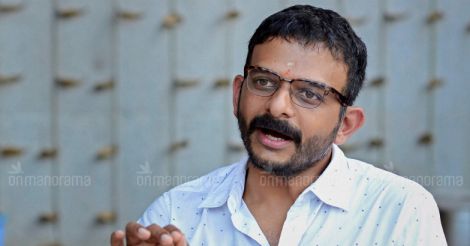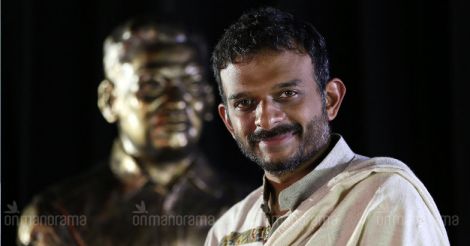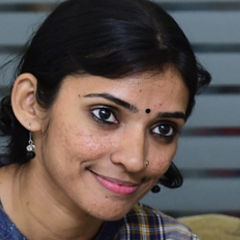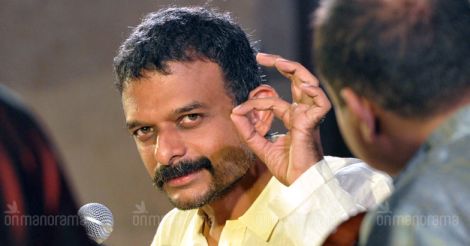'Sree guruguha sanmuditham chinmoola kamalasthitham
Sree Gananatham Bhajare...'
As T.M. Krishna ended his singing, a droplet of water sweetly dripped from the rocks - like nature's violin note.
He was standing near the underground water channel at the Church of the Holy Sepulchre in Jerusalem where Christ was buried after crucifixion. Sound waves lashed the rocks and flowed back as echoes; Christ and Krishna gently stroke the wounds of time.
Krishna, who visited strife-hit Jerusalem, was accompanied to the little-known visual experiences of the church by his host Professor David Schulman. Like his host - a messenger of peace who believes that music has healing qualities - Krishna too believes in the mighty power of art. And he vehemently demands that artistes should be sincerely involved so that art can touch hearts.
T.M. Krishna is indeed a phenomenon. His honest interventions in current issues are examples of unparalleled activism. His music and his opinions - fearless as they are - spring from a conscience battling with injustices. That's the very reason why the world jolts when Krishna marks his fiery presence.
It must be for the first time in its 2,000-year history that the Sepulchre Church was listening to a Carnatic composition. Please do tell us more about that incredible rendition.
We were out to watch the Jerusalem hills in the morning. As you know, the Jerusalem hill is where the main sites of the three prominent religions are. The Western Wall, Christ's Crucifixion is there; and of course one of the most important mosques of Islam is also there. After all these, David said he would take us to the Church. Actually you go past the church, and then go down inside. There is some stairway and when you reach down there, you can see an underground water channel - a river or something. And the sound there is quite magical. It is completely hollow with rocks around and water flowing. And that's where I sang. The sound there was absolutely stunning. When you spoke there, it was quite beautiful to hear the sound. So, I wanted to know how the sound would be when one sings. And I sang.
Which was that composition?
I sang Sree Gananatham Bhajare. Composition in Eeshamanohari raaga by Muthuswami Dikshitar.
Weren't there other visitors to witness this unusual musical experiment?
In fact, not many people know about this place. David (Schulman) said only locals knew about this place and it's quite beautiful. So there were only David, my violinist H.M. Bhaskar, mrudangam player Praveen Kumar, and I. Just the four of us. There was nobody else.
Just like another spring of music... Now about the main part of the Palestine, Israel visit.
That was a tour of Israel and Palestine. Something that we were thinking of for many years. Originally, the idea was to hold a peace concert. A concert which both Israelis and Palestinians can attend. The idea took birth in Palestine. But the politics is very very sharp. So, what we decided was to hold two concerts - one in West Jerusalem, another in what is Israeli occupied East Jerusalem. And then I traveled in Palestine for a whole day. I went quite deep into Jordan Valley, talked at length to shepherds. People who lived in the mountains. I almost turned into a journalist for a day. I would be writing about this soon. Because these conversations are important. What's happening in Palestine is horrible. It's shocking that all these are happening in the twenty-first century under our 'watch.' And a government body itself supervising oppression. I have no hesitation in saying that the government of Israel is bound to answer several questions.
You have been to the birthplace of Christ. Who's Christ for you? What's his place in Krishna's heart?
Christ is part of our culture. I know Christ as much as I know Rama or Krishna or the Prophet. I think the most moving part of all those religious sites was that marble stone where Jesus' body was laid soon after the crucifixion. Very very emotional sight. You can see so many people going down there to take a look at it. It's extremely moving. As you know it was Emperor Constantine's mother Helen who discovered these remnants. Whether it's real or not, does not matter. Whether all the incidents had indeed taken place there - these questions really don't matter. The whole place has a lot of contradictions. This is one of the most important religious sites in the world where peace should have been the way; but we have the most violent things happening. I don't think logic has got anything to do with it. A certain kind of closed minded attitude and intolerance. Divisions, then divisions within divisions. Enmity. Each group considering itself above the rest. Then we wonder what's the point of all this. But contradictions make the world.
 TM Krishna
TM KrishnaCan we say things would have been different if there were TM Krishnas in all fields?
I do not know. Perhaps, it would have been.
Why is it that artistes choose to refrain from intervening in what is happening around?
I do not know why. The world of art in India is generally silent on political and social issues. That's quite sad. Some may talk about political parties. But party politics is not politics. What we need is a political mind. Artistes should engage with people, government, and democracy. They should engage with the problems in society - gender issues, caste issues. It's my belief when artists engage with the world around, art becomes richer. Except for the theater and to some extent visual arts, artists in general never attempt such interventions. They even find pleasure in keeping a distance. They excuse themselves saying that these things don't affect them. Sort of floating. That's nonsense. I'm not saying there should be politicians emerging from the world of art. It may or may not happen. But we need political artistes. India needs political artistes.
You had written an open letter to prime minister Narendra Modi after a man was murdered in Uttar Pradesh following an allegation that he kept cow meat at home. That was a bold protest. Did you get any response from the PM?
Never. I never got a reply. I sent a copy of the letter directly to Modi out of courtesy. After all, it is addressed to him. I sent it to the prime minister's office. I never expected a reply. I'm just one among the millions of citizens in the country.
Looks like Modi's calculations have gone wrong in the end, in his bid to take over Tamil Nadu.
BJP is trying hard to enter Tamil Nadu. But it will be hard. I feel Tamil Nadu won't yield to BJP so easily. At the same time I do not think Kerala is safe from BJP. It won't be easy for the BJP to build a popular base in Tamil Nadu.
 TM Krishna. File photo/AP
TM Krishna. File photo/APDemocratic dictatorship
Krishna is one of the few to hit hard on Tamil Nadu politics. You recently called it a democratic dictatorship.
Yes, that is what I said. And I repeated it on a television channel too.
Did you foresee the evolution of Tamil Nadu politics in the present style after the death of Jayalalithaa?
It's not evolution, but total destruction. If you ask me if I had foreseen what is happening now. Well, I don't know. May be not this sort of a development, specifically. But all of us had expected this crash of Anna DMK. These are inevitable things that cannot but simply happen at some point of time. The people of Tamil Nadu were scared of Jayalalithaa and Sasikala. Everybody knew Sasikala was the one behind Jayalalithaa. Everybody knew about land-grab. But no one spoke in public. So I hold Jayalaitha as much culpable as Sasikala in all these matters. I do not agree to the prospect of Sasikala being painted as the devil and Jayalalithaa the goddess.
The dissenting Jaya devotees now argue that Jayalalithaa was innocent and that Sasikala and cronies were forcing 'Amma' to do things.
You cannot exonerate Jayalalithaa. She created Sasikala. Let's be clear about it. Everything happened with her knowledge. Don't tell me the chief minister didn't know about it. Therefore, the developments were not a surprise. It was in fact even logical - that Sasikala would come to the fore after Jayalalithaa, that there would be a power struggle and inner revolt. I don't understand the sudden change in Pannerselvam. He said that his conscience called him and hence the revelations. The truth is that Pannerselvam too was part of the same system. He was stepney chief minister three times. It cannot be accepted that he didn't know what was happening. Suddenly he gets a call of conscience and transforms himself. He finds the courage to open up and raise a banner of revolt. Stalin staged a drama in the assembly. Pannerselvam got drowned amid those scenes. That is what you call politics. I don't think Anna DMK would survive all this. They can't. Tamil Nadu will have to wait for years to squeeze itself out of this big mess.
What about the DMK?
No one knows what's going to happen to the DMK in future, after Karunanidhi. My feeling is that the DMK will be on a slightly stronger footing now that Stalin has emerged. He has come in as an independent man which most people didn't expect. Despite that horrible behavior in the assembly - they had no business to stage that drama there - my feeling is that the DMK will not perish soon. But we still need new faces. We need to move beyond Anna DMK and DMK. We don't know from where those faces will emerge. However, I feel we will get an idea without much delay. I am positive about it.
BJP leader Subramanian Swamy was also there, interfering in Anna DMK politics.
I have no idea about his moves. I don't understand what he says. He says many things. But people don't understand. Same with me too.
Humanity of the butcher
There are many including writer Jayamohan who criticize you as a musician. Noted music critic P. Ravikumar pointed out in an article that Krishna was not around to lambast the upper caste domination in Carnatic music when his guru Semmangudi was alive. And that Krishna's anti-Brahminism is as ridiculous as a butcher's humanitarian speech against killing...
I will answer each part of the question. I am upper caste. I was born in an upper caste family. I don't want to run away from that fact. I can't be held responsible for this. It is important for all human beings to question the way they live their life. I've a right to do that and nobody can stop me. Nobody can tell me I don't have the right to talk about it. I am also trying to change. I may not be able to change as much as people want me to change. All right, I will try. I engage with all the problems I've within myself. If I make mistake, I shall learn from it. But I'm not going to stop this process. I will not abandon the habit of raising questions.
The allegation is that I never raised the caste question when Semmangudi mama was alive. Krishna then was very different from today's Krishna. The Krishna sitting in front of you is not the one who was the disciple of Semmangudi. For those who insist that I should have recognized the caste factor then, I'm sorry I did not. I apologise. I cannot go back in time and change.
If Semmangudi mama was alive today we might have entered into a dynamic debate. He might have been glad to note my evolution. The Krishna you all know evolved just ten years ago. It is a post-Semmangudi development. If you feel that I should have raised these questions when he was alive, I wish I had, I'm sorry I didn't raise those questions. But you can't hold me responsible for this as well. I'm a human being with limitations. I understand those limitations, I accept them and try to improve as much as I can. I am sorry if I cannot rise up to the expectations of others. But I will not apologize for what I believe is my honest and sincere effort to realize myself and realize what I see. I shall do this whenever and wherever possible.
There's a childhood photo of yours in the company of famous singer Yesudas.
Oh yes. I think it dates back to 1985. My mother used to run a school named Kalapeedham. Dasannan (Yesudas) came there for a fund-raising event for the school. I still remember - I sang the prayer song that day. I was nine or ten years old and the youngest in the class.
And you were sporting a beautiful smile in that photograph.
That's interesting. Now a days people complain that I don't smile enough. They say that I'm too serious and I should smile more... (Don't you think so too? - Krishna asks our photographer who instantly agrees).
But that childhood photo is noted for that smile; any way, back to Yesudas. It is interesting to note that many connoisseurs praise him for his film songs and call him ganagandharva but he is not their favorite when it comes to Carnatic music.
There is this attitude with Dasanaa's Carnatic singing. There is criticism within the Carnatic world, specifically. There's this feeling that Dasanna's music is not Carnatic enough. We can debate this on either side. But I want to make one point. You are willing to accept so many other musicians who may not be so classical enough, but you have got a problem with Dasannan- I have got a problem with that.
T. Vrinda is Krishna's idol. What do you think is the magic of her music?
Vrindamma is one of the greatest musicians of all times. She was the granddaughter of Veena Dhanammal. Theirs was a legendary family; it produced many greats like Bala Saraswathi and T. Muktha. Vrindamma's music is something else; it comes from some other world. I've been greatly influenced by her music. Not just her, but the whole family. Their sense of sound is what captures us. I never heard Vrinda live in my life. But I've heard her sister Mukthamma. I relied on recorded concerts to feel the music of Vrindamma. She is mainly noted for the complex gamaka work that happened in her music. Very very subtle, complex gamakas. Her aalapanas were short; but the aesthetic depth was quite magical. Every note was magnified in a 70 mm screen. And the clarity! It was like watching music unraveling itself in slow motion. I say 'slow motion' not in the sense of the slowness of it but its clarity.
Carnatic musician G.N. Balasubramaniam once observed that Kathakali verses were best suited for rendition experiments for musicians. Do you enjoy Kathakali?
I do not know much about the art; but I've slowly started enjoying art forms like Kathakali. Yes, I do enjoy Kathakali. Actually I started liking all these in the past five or six years. I like other art forms too like Koodiyattam and Theyyam which is Kerala's own. Theyyam has a magical beauty. The blaze and the power! I would like to spend more time for these. In Tamil Nadu, we have got an art form called Koothu and I enjoy it. While taking note of other art forms, I think, you also reflect about your own art. Whether it's art or nature, when we perceive some sort of freedom, it stays in our heart.
This is the first of a two-part interview. Read the second part: We move forward if we are honest enough to acknowledge an issue: TM Krishna


























 TM Krishna performing at an event organized by Kochi Muziris Beinnale in Kochi. File photo: Josekutty Panackal
TM Krishna performing at an event organized by Kochi Muziris Beinnale in Kochi. File photo: Josekutty Panackal